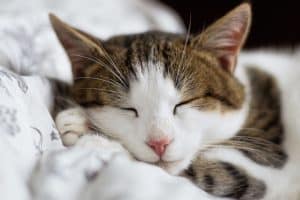Cats can be mysterious creatures, with behaviors that sometimes baffle us. One common behavior that many cat owners have observed is their fear of mirrors. But why exactly are cats afraid of mirrors?
Cats are territorial animals and seeing their reflection in a mirror can be confusing and threatening to them. Here’s a breakdown of the reasons behind this behavior:
Instinctual response to perceived threat
When a cat catches a glimpse of itself in a mirror, its natural instincts kick in, seeing the reflection as another cat intruding on its territory. Cats are territorial creatures by nature, and any perceived threat to their space can trigger a fear response. This reaction goes back to their ancestral roots when survival depended on being wary of potential competitors. So, if your feline friend hisses or puffs up when faced with their reflection, it’s simply their instincts taking over.
Lack of understanding of reflections
Cats may lack the cognitive ability to understand the concept of reflections, which can lead to confusion and fear when they see themselves in a mirror. Unlike humans or some other animals, cats don’t recognize their own reflections. To them, it appears as a strange, unfamiliar feline invading their space. The inability to grasp that it’s their own image staring back at them can be unsettling for cats, causing them to react defensively.
Here are a few tips to help your cat feel more comfortable around mirrors: 1. Introduce them to mirrors gradually, allowing them to investigate at their own pace. 2. Place toys or treats near the mirror to create positive associations. 3. Use interactive play to distract your cat from fixating on their reflection. 4. If your cat continues to be afraid, consider covering or removing the mirror to reduce their anxiety.
By understanding your cat’s instincts and their perception of reflections, you can help them feel more at ease in your home.
Heightened sense of self-preservation
Cats’ fear of mirrors can be attributed to their heightened sense of self-preservation. When they see their reflection in the mirror, they may perceive it as a “strange” cat invading their territory. This triggers their instinct to protect themselves from potential threats, leading to fear and anxiety. It’s important to understand that cats are naturally cautious animals, and anything unfamiliar or perceived as a danger can set off their alarm bells.
Visual sensitivity in cats
Cats have incredibly sensitive eyes that are adapted for hunting and navigating their environment. When they look into a mirror, they may see their own reflection as a threat due to the visual discrepancies caused by the mirror’s flat surface. This can confuse their senses and cause distress, as their brain struggles to process the image of another cat that doesn’t align with their normal field of vision.
Additional Unique Insight:
– Cats have a wider field of vision than humans, allowing them to see more of their surroundings at once. This heightened visual perception means that when they see a mirror, the illusion of another cat staring back at them can be particularly unsettling, triggering their fear response.
Remember, when it comes to helping your cat overcome its fear of mirrors, patience is key. Gradual exposure, positive reinforcement, and creating a safe environment can help them feel more at ease and less threatened by their own reflection.
Historical context of mirrors
Did you know that mirrors are a relatively modern invention in the grand scheme of things? Cats, with their keen senses and unique evolutionary history, may find mirrors unsettling due to the unfamiliar reflection staring back at them. Their instinctual response to potential threats could trigger fear and uncertainty when faced with their own reflection. To help your cat overcome this fear, it’s essential to understand their natural tendencies and provide a safe environment for them to explore and adjust to mirrors.
Ways to help your cat overcome fear
- Gradual exposure: Introduce your cat to mirrors gradually, allowing them to approach at their own pace. Start with short, supervised sessions and gradually increase the time spent near the mirror.
- Positive reinforcement: Encourage your cat with treats and praise when they show curiosity or calm behavior around the mirror. Associating positive experiences with the mirror can help alleviate fear over time.
- Interactive play: Engage your cat in interactive play near the mirror to create positive associations and reduce anxiety. Use toys or treats to keep them entertained and distracted from any fear-related behaviors.
- Create a safe space: Provide your cat with hiding spots or elevated perches near the mirror so they can observe without feeling threatened. Having a comfortable space nearby can help them feel secure while adjusting to the mirror.
- Consult a professional: If your cat’s fear of mirrors persists or escalates, consider consulting a veterinarian or animal behaviorist for additional guidance. They can provide tailored advice and support to help your cat overcome their fear in a safe and effective manner.
By taking a proactive approach and understanding your cat’s unique needs, you can help them feel more at ease around mirrors and create a positive experience for both of you.
Interactive play and positive reinforcement
Engaging your cat in interactive play near mirrors can help them associate these surfaces with positive experiences. By incorporating toys, treats, and affection during playtime, you can create a more inviting environment for your cat around mirrors. Encourage your cat to interact with their reflection in a playful manner, reinforcing the idea that the mirror is not something to fear. Over time, this positive reinforcement can help reduce your cat’s anxiety and fear towards mirrors.
Unique insight: Consider using a laser pointer or a feather wand toy to engage your cat in play near mirrors. These interactive toys can help redirect your cat’s attention towards enjoyable activities and away from their fear of mirrors.
Seeking professional advice
If your cat’s fear of mirrors is severe and impacting their daily life, it may be necessary to seek professional help. Consult with a veterinarian or animal behaviorist to address the underlying causes of your cat’s phobia and develop a tailored behavior modification plan. Professionals can provide expert guidance on how to desensitize your cat to mirrors gradually and safely.
Remember, your cat’s well-being is a priority, so don’t hesitate to reach out for professional assistance if needed. Veterinary experts can offer valuable insights and strategies to help your cat overcome their fear of mirrors effectively.
Alex, a passionate animal lover, has experience in training and understanding animal behavior. As a proud pet parent to two dogs and three cats, he founded AnimalReport.net to share insights from animal experts and expand his knowledge of the animal kingdom.




